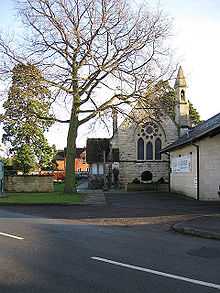Up Hatherley
| Up Hatherley | |
 Up Hatherley |
|
| Population | 6,072 (2011)[1] |
|---|---|
| OS grid reference | SO914204 |
| Civil parish | Up Hatherley |
| Shire county | Gloucestershire |
| Region | South West |
| Country | England |
| Sovereign state | United Kingdom |
| Post town | CHELTENHAM |
| Postcode district | GL51 |
| Dialling code | 01242 |
| Police | Gloucestershire |
| Fire | Gloucestershire |
| Ambulance | South Western |
| EU Parliament | South West England |
| UK Parliament | Tewkesbury |
|
|
Coordinates: 51°53′07″N 2°07′28″W / 51.8853°N 2.1245°W
Up Hatherley is a civil parish and a suburb of the spa town of Cheltenham, Gloucestershire, England. Formerly a hamlet in the parish of Shurdington, it became a parish in 1887 and became a part of Cheltenham in 1991.[2]
History
The village was recorded (combined with Down Hatherley) as Hegberleo in 1022.[2] It was listed as Athelai in the Domesday Book of 1086.[3][4] In 1273 it was known as Dunheytherleye and in 1221, Hupheberleg.[4] The name derived from the Old English hagu-thorn + lēah meaning "hawthorn clearing".[4] the distinguishing affixes "Up" and "Down" derived from the Old English upp meaning "higher upstream" and dūne meaning "lower downstream".[4] Down Hatherley is a separate parish three miles (5 km) downstream on the Hatherley Brook.[2]
The parish of Up Hatherley was formed from a small settlement of scattered farms in 1887 and remained little changed until 1945.[2] Prior to that it had been considered a hamlet in the parish of Shurdington. Along with Swindon Village, Leckhampton and Prestbury, the parish was added to the borough of Cheltenham in 1991.[5] Part of the parish was transferred to the parish of Shurdington.[5]
Governance
Up Hatherley, with a small part of the parish of Leckhampton, forms the ward of Up Hatherley, represented by two councillors on Cheltenham Borough Council.[6] It is part of the Cheltenham constituency and is represented in parliament by Liberal Democrat MP Martin Horwood.
Church

There was a church at Up Hatherley from at least 1022.[7] The original church was destroyed in a fire in about 1640 and Up Hatherley parishioners had to use the north aisle of the church of nearby village Shurdington.[2][7][8] The church of St. Philip and St. James was built between 1885 and 1886. It cost £2,000 and was paid for by Rev. W. H. Gretton and Mrs Gretton.[2] The late Rev. Gretton had donated the land and his widow had intended to have a chapel built since her failing health made it difficult for her to travel as far as Badgeworth to attend church.[7] When residents asked her if they could attend the proposed chapel, she decided to have a village church built.[7] The new church, seating approximately 150 parishioners, was consecrated in 1886 by the Lord Bishop of Gloucester.[7] The first vicar of the new parish was Rev. E. L. Jennings.[7]
Clergy
- E. L. Jennings 1885-1890
- William Henry Cotes 1890-1915
- Richard Williams 1915-1925
- Charles William Peach 1925-1944
- W. H. Walsham How 1945-1947
- Howard Porter 1947-1959
- Cecil William Smith 1959-1980
- John Heidt 1980-1996
- K. Martin Wray 1997-2004
- Roger Raven 2005-2009
Notable residents
- Brian Jones (1942–1969), musician and a founding member of The Rolling Stones[2]
References
- ↑ "Civil parish population 2011.Retrieved 28 March 2015".
- ↑ 2.0 2.1 2.2 2.3 2.4 2.5 2.6 "Up Hatherley, Warden Hill and Surrounding Areas". Cheltenham4U.co.uk. Retrieved 24 January 2010.
- ↑ "Down Hatherley, Gloucestershire". Domesday Book. The National Archives. 1086. Retrieved 24 January 2010.
- ↑ 4.0 4.1 4.2 4.3 Mills, A. D. (1998). Dictionary of English Place-Names. Oxford University Press. p. 170. ISBN 0-19-280074-4.
- ↑ 5.0 5.1 "The Gloucestershire (District Boundaries) Order 1991". Government of the United Kingdom. 1991. Retrieved 24 January 2010.
- ↑ "Up Hatherley ward". Gloucestershire County Council. 8 June 2009. Retrieved 24 January 2010.
- ↑ 7.0 7.1 7.2 7.3 7.4 7.5 "History of Saints Philip & James". Saints Philip & James Church, Up Hatherley. Retrieved 24 January 2010.
- ↑ "Extract From National Gazetteer, 1868". GENUKI. Retrieved 24 January 2010.
| ||||||